Aaron Swartz
description: American computer programmer and activist known for RSS and Reddit
45 results
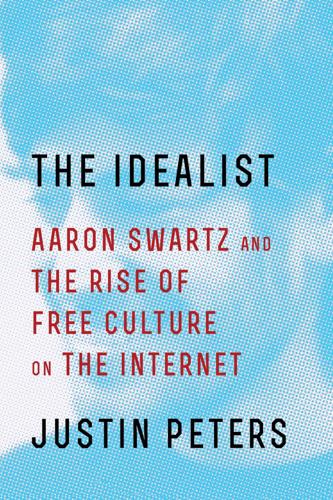
The Idealist: Aaron Swartz and the Rise of Free Culture on the Internet
by
Justin Peters
Published 11 Feb 2013
Palmer. 15 Aaron Swartz, “SFP: Come see us,” Aaron Swartz: The Weblog, April 16, 2005, http://www.aaronsw.com/weblog/001679. 16 Ibid. 17 Ibid. 18 Interview with Simon Carstensen, February 2013. 19 Aaron Swartz, “Introducing Infogami,” Infogami, circa March 4, 2006, https://web.archive.org/web/20060304203354/http://infogami.com/blog/introduction. 20 Interview with Steve Huffman, January 2013. 21 Aaron Swartz, “Stanford: The Cynic Returns,” Aaron Swartz: The Weblog, April 16, 2005, http://www.aaronsw.com/weblog/001680. 22 Aaron Swartz, “I Love the University,” Aaron Swartz: The Weblog, July 26, 2006, http://www.aaronsw.com/weblog/visitingmit. 23 Aaron Swartz, “On Losing Weight,” Aaron Swartz: The Weblog, July 26, 2006, http://www.aaronsw.com/weblog/losingweight. 24 Aaron Swartz, “A Night at the Coop,” Raw Thought, October 24, 2006, http://www.aaronsw.com/weblog/coopnight. 25 Swartz, “Stanford: The Cynic Returns.” 26 Aaron Swartz, “A Non-Programmer’s Apology,” Aaron Swartz: The Weblog, May 27, 2006, http://www.aaronsw.com/weblog/nonapology. 27 Aaron Swartz, “Stanford: Mr.
…
Ashcroft, 537 U.S. 186 (2003). 63 Richard Koman, “Riding along with the Internet Bookmobile,” Salon, October 9, 2002, http://www.salon.com/2002/10/09/bookmobile/. 64 Lawrence Lessig, “Brewster’s Brilliance,” Lessig, October 17, 2002, http://www.lessig.org/2002/10/brewsters-brilliance/. 65 Poynder, “The Basement Interviews.” 66 Lawrence Lessig, “from the front line,” October 13, 2002, http://www.lessig.org/2002/10/from-the-front-line/. 67 Aaron Swartz, “Arrgh, pirates,” Aaron Swartz: The Weblog, February 04, 2002, http://www.aaronsw.com/weblog/000158. 68 Aaron Swartz, “LimeWire has gotten really good,” Aaron Swartz: The Weblog, January 24, 2002, http://www.aaronsw.com/weblog/000143. 69 Aaron Swartz, “Trip Notes,” Aaron Swartz: The Weblog, October 08, 2002, http://www.aaronsw.com/weblog/000647. 70 Aaron Swartz, “Mr. Swartz Goes to Washington,” Aaron Swartz: The Weblog, October 10, 2002, http://www.aaronsw.com/weblog/000650. 71 Ibid. 72 Eric Eldred to Book People mailing list, October 14, 2002, http://onlinebooks.library.upenn.edu/webbin/bparchive?
…
“CO-OPT OR DESTROY” 1 Aaron Swartz, “Checking In,” Schoolyard Subversion, December 23, 2001, http://web.archive.org/web/20020205111032/http:/swartzfam.com/aaron/school/. 2 Aaron Swartz, “Instant Message from LelandJr247,” Aaron Swartz: The Weblog, December 11, 2003, http://www.aaronsw.com/weblog/001087. 3 Aaron Swartz, “Stanford: Day 1,” Aaron Swartz: The Weblog, September 21, 2004, https://web.archive.org/web/20041009200559/http://www.aaronsw.com/weblog/001418. 4 Aaron Swartz, “Stanford: Day 3,” Aaron Swartz: The Weblog, last modified June 3, 2005, http://www.aaronsw.com/weblog/001421. 5 Interview with Seth Schoen, January 2013. 6 Aaron Swartz, “Stanford: Day 58,” Aaron Swartz: The Weblog, November 15, 2004, http://www.aaronsw.com/weblog/001480. 7 Wilcox-O’Hearn, “Part 1.” 8 Aaron Swartz, “Home Again,” Aaron Swartz: The Weblog, February 13, 2005, http://www.aaronsw.com/weblog/001558. 9 Aaron Swartz, “News Update,” Aaron Swartz: The Weblog, February 17, 2003, http://www.aaronsw.com/weblog/000838. 10 Paul Graham, “What I Did This Summer,” PaulGraham.com, October 2005, http://www.paulgraham.com/sfp.html. 11 Paul Graham, “Summer Founders Program,” PaulGraham.com, March 2005, http://paulgraham.com/summerfounder.html. 12 Ibid. 13 Infogami, March 4, 2006, https://web.archive.org/web/20060323211212/http://infogami.com/. 14 Aaron Swartz, “infogami,” Infogami, circa October 25, 2005, https://web.archive.org/web/20051025013124/http://infogami.com/.
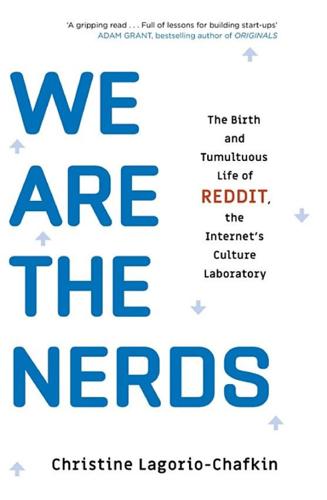
We Are the Nerds: The Birth and Tumultuous Life of Reddit, the Internet's Culture Laboratory
by
Christine Lagorio-Chafkin
Published 1 Oct 2018
“It genuinely opened his eyes”: Noam Scheiber, “The Inside Story of Why Aaron Swartz Broke Into MIT and JSTOR,” New Republic, February 13, 2003. It was titled the Guerilla Open Access Manifesto: Aaron Swartz, “Guerilla Open Access Manifesto,” July 2008. “get bossed around”: Aaron Swartz, “Aaron’s Patented Demotivational Seminar,” Raw Thought, March 27, 2007. “What was so striking about Aaron”: “Sir Tim Berners-Lee pays tribute to Aaron Swartz,” Telegraph, January 14, 2013. Brewster Kahle of the Internet Archive: Brewster Kahle, speaking at a memorial to Aaron Swartz, January 24, 2013. Malamud emailed him back: Carl Malamud archives, Aaron Swartz email message 299, https://public.resource.org/aaron/pub/msg00299.html.
…
You Are Making Us Sound Stupid “We all started getting touchy”: Aaron Swartz, “How to Get a Job Like Mine,” speech, as prepared, for the Tathva 2007 computer conference at NIT Calicut. He wrote a program: Aaron Swartz, “Some Announcements,” Raw Thought (blog), January 5, 2006. He built and released: Aaron Swartz, “Wassup?,” Raw Thought, March 27, 2006. “You’d think, this is a kid”: The Internet’s Own Boy: The Story of Aaron Swartz, documentary film by Brian Knappenberger, 2014. “The situation was so toxic”: Peters, The Idealist, 157. We Are the Nerds “Suits…are the physical evidence”: Aaron Swartz, “The Anti-Suit Movement,” Raw Thought, March 16, 2010.
…
Investigators searched for a motive: David Kravets, “Feds Used Aaron Swartz’s Political Manifesto Against Him,” Wired, February 22, 2013. It was a direct call to action: Swartz, “Guerilla Open Access Manifesto.” “Most people, it seems”: Aaron Swartz, “Stanford: Mr. Unincredible,” aaronsw.com, March 26, 2005. “the bad thing”: Eulogy to Aaron Swartz, delivered by Taren Stinebrickner-Kauffman, January 24, 2013. “Am I always going to feel like this?”: Peters, The Idealist, 258. “were more interested in making”: Eulogy to Aaron Swartz, delivered by Taren Stinebrickner-Kauffman. a massive memorial service: Susan Berger, “Family, Web Celebs Mourn Internet Activist,” Chicago Tribune, January 16, 2013.
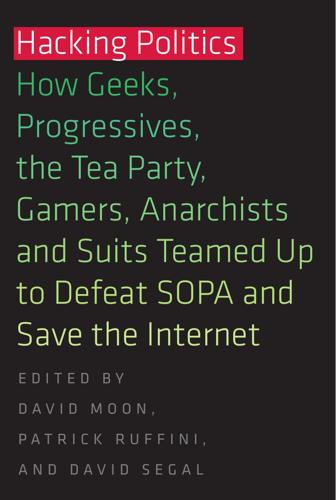
Hacking Politics: How Geeks, Progressives, the Tea Party, Gamers, Anarchists and Suits Teamed Up to Defeat SOPA and Save the Internet
by
David Moon
,
Patrick Ruffini
,
David Segal
,
Aaron Swartz
,
Lawrence Lessig
,
Cory Doctorow
,
Zoe Lofgren
,
Jamie Laurie
,
Ron Paul
,
Mike Masnick
,
Kim Dotcom
,
Tiffiniy Cheng
,
Alexis Ohanian
,
Nicole Powers
and
Josh Levy
Published 30 Apr 2013
RON PAUL The Battle for Internet Freedom Is Critical for the Liberty Movement ERIN MCKEOWN A Case for Digital Activism by Artists BRAD BURNHAM On the Freedom to Innovate MARVIN AMMORI SOPA and the Popular First Amendment CORY DOCTOROW Blanket Licenses: One Path Forward in Copyright Reform LAWRENCE LESSIG The Internet Can Help Strike at the Root Conclusion Aaron Swartz speaks at the New York City anti-SOPA rally on January 18th, 2012 A MOMENT FOR AARON: 1986-2013 This book was constructed over the course of the fall, and we intended to release it earlier this winter, but then tragedy struck: our friend and colleague Aaron Swartz committed suicide on January 11th, while under federal indictment for downloading too many academic articles housed by the online cataloguing service called JSTOR.
…
I’d lost a Democratic primary for Congress a couple months prior during which I’d garnered the support of a number of progressive Netroots groups, one of which was called the Progressive Change Campaign Committee and had been co-founded by whiz kid Aaron Swartz, renowned across the web for his Python coding skills and Internet evangelism. Aaron was based in Boston and spent much of the last couple months of my campaign camped out in our Providence headquarters, helping us rig up cheap polls and robo-calls and that sort of thing. One day he told me he was quitting PCCC; and here I was, six weeks later, working with him at Demand Progress. Aaron Swartz Now I’ve actually done a few online petitions before. I’ve worked at some of the biggest groups in the world that do online petitions.
…
Many opponents to SOPA/PIPA identify primarily as intellectual property reform activists. This sign, from a New York City tech community protest on January 18, 2012, makes the point using fairly blunt language. http://www.meetup.com/ny-tech/photos/5468462/87002632/ FOR ME, IT ALL STARTED WITH A PHONE CALL AARON SWARTZ Aaron Swartz was a writer, a technologist, and an Internet freedom and social justice activist. The essay below is adapted from a talk Aaron gave in conjunction with the software consulting firm ThoughtWorks, where he worked for most of 2012. For me, it all started with a phone call. It was way back in September 2010, when I got a phone call from my friend Peter.
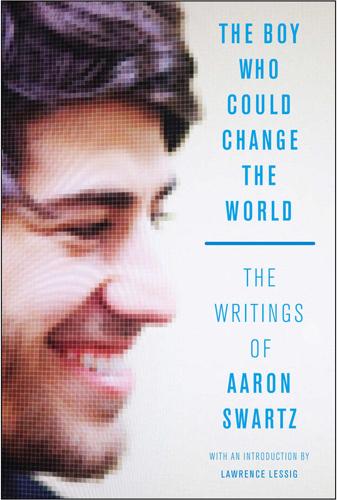
The Boy Who Could Change the World: The Writings of Aaron Swartz
by
Aaron Swartz
and
Lawrence Lessig
Published 5 Jan 2016
No part of this book may be reproduced, in any form, without written permission from the publisher. Excerpt from Aaron Swartz’s A Programmable Web: An Unfinished Work © 2013 Morgan & Claypool Publishers. Used with permission. Requests for permission to reproduce selections from this book should be mailed to: Permissions Department, The New Press, 120 Wall Street, 31st floor, New York, NY 10005. Published in the United States by The New Press, New York, 2015 Distributed by Perseus Distribution LIBRARY OF CONGRESS CATALOGING-IN-PUBLICATION DATA Swartz, Aaron, 1986-2013. The boy who could change the world : the writings of Aaron Swartz / Aaron Swartz ; with an introduction by Lawrence Lessig ; part introductions by Benjamin Mako Hill, Seth Schoen, David Auerbach, David Segal, Cory Doctorow, James Grimmelmann, and Astra Taylor ; postscript by Henry Farrell.
…
He was never on The Colbert Report or The Daily Show; NBC Nightly News never once covered the thoughts of Aaron Swartz. Yet his influence weaved itself through the lives of an incredible number of very different souls. He found us, and, wound us up, and set us on the path that he, and maybe we, thought best. There are scores still left in his command. There is an endless amount that we must finish. For this writer, and thinker, and activist, and hacker, and dear friend, we will. —Lawrence Lessig FREE CULTURE Aaron Swartz’s life was shaped by an ethical belief that information should be shared freely and openly.
…
§ See Terry Fisher, Promises to Keep [Stanford: Stanford University Press, 2004]. “Assuming that the ISPs pass through to consumers the entire amount of the tax, that average fee would rise by $4.88 per month” (p. 31); 4.88 × 12 ≈ 59, so I say $60/yr. UTI Interview with Aaron Swartz https://archive.org/download/AaronSwartz20040123UTIInterview/Aaron-Swartz-2004-01-23-UTI-interview.html January 23, 2004 Age 17 Hey. Who are you? Well, I’m trying to figure that out myself, actually. Broadly, though, I’m a teenage kid who’s interested in improving the world (mostly through law, politics, and technology). This year, I’m going to try to update my weblog daily with interesting thoughts, program some interesting new website software, and work on some website projects that help people better understand what’s going on in American politics.
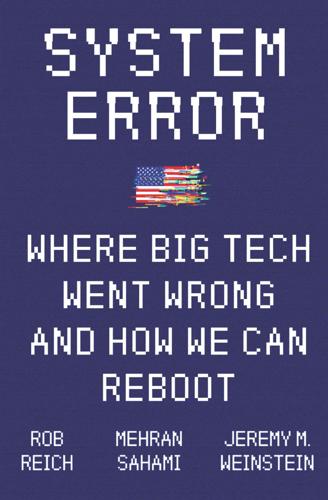
System Error: Where Big Tech Went Wrong and How We Can Reboot
by
Rob Reich
,
Mehran Sahami
and
Jeremy M. Weinstein
Published 6 Sep 2021
Reddit is today: Julia Boorstin, “Reddit Raised $300 Million at a $3 Billion Valuation—Now It’s Ready to Take on Facebook and Google,” CNBC, February 11, 2019, https://www.cnbc.com/2019/02/11/reddit-raises-300-million-at-3-billion-valuation.html. “Information is power”: Aaron Swartz, “Guerilla Open Access Manifesto,” Archive.org, July 2008, https://archive.org/details/GuerillaOpenAccessManifesto/mode/2up. “At most ‘technology’ conferences”: Aaron Swartz, “Wikimedia at the Crossroads,” Raw Thought (blog), August 31, 2006, http://www.aaronsw.com/weblog/wikiroads. “Aaron Swartz this is for you”: Larissa MacFarquhar, “The Darker Side of Aaron Swartz,” New Yorker, March 11, 2013, https://www.newyorker.com/magazine/2013/03/11/requiem-for-a-dream. total liberty for the wolves: Isaiah Berlin, The Crooked Timber of Humanity: Chapters in the History of Ideas, edited by Henry Hardy, 2nd ed.
…
In the month following his death, the hackers known as Anonymous infiltrated the websites of MIT and the US State Department and declared, “Aaron Swartz this is for you.” Lawrence Lessig eulogized Swartz as someone he had mentored but who, in the end, had really mentored him. Memorials sprang up around the world. It’s impossible to know what Swartz was thinking when he repeatedly violated JSTOR’s terms of service. Or what prosecutors were thinking when they pressed their case even after JSTOR withdrew. And of course it’s impossible to peer into the mind of a person struggling with depression and wonder what might have brought him to contemplate suicide and then to take his own life. For us, however, Aaron Swartz’s death is a hinge event in the evolution of the politics and ethics of technology.
…
He’s been encouraged by his professors, his peers, and his investors to think bigger and be ambitious. But too rarely do people stop and ask: Whose problem are you solving? Is it a problem actually worth solving? And is the solution proposed one that would be good for human beings and for society? Back in 2004, just as Silicon Valley was reemerging from the “dot-com bust,” a young man named Aaron Swartz enrolled at Stanford University. Like Browder, he had been fascinated by computer programming from an early age. He’d won a national prize at the age of thirteen for his creation of an online collaborative library, theinfo.org. At fourteen, he helped create the Really Simple Syndication (RSS) specification, a widely used internet protocol that permitted automatic access to updates on websites anywhere.
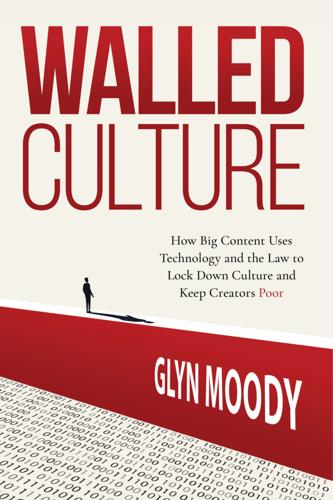
Walled Culture: How Big Content Uses Technology and the Law to Lock Down Culture and Keep Creators Poor
by
Glyn Moody
Published 26 Sep 2022
ALSO BY GLYN MOODY Rebel Code Digital Code of Life How Big Content Uses Technology and the Law to Lock Down Culture and Keep Creators Poor Glyn Moody Walled Culture: How Big Content Uses Technology and the Law to Lock Down Culture and Keep Creators Poor 978-946459495-9 (paperback) 978-946459849-0 (eBook) Published by BTF Press, 2022 publishing@btfpress.org This worked is licensed under a Creative Commons CC0 1.0 Universal (CC0 1.0) Public Domain Dedication license. To my family. Contents Foreword Chapter 1. From Analogue to Digital Big Content’s plan to take total control online Chapter 2. Hostage Works and Vanishing Ebooks Publishers sue Google and the Internet Archive for sharing knowledge and culture Chapter 3. Aaron Swartz’s Manifesto Making all publicly funded research freely available through open access Chapter 4. Internet Users at Risk Napster, three strikes and the Great Internet Blackout Chapter 5. From Scare Tactics to Censorship Big Content’s wrongful takedowns and Web site blocking Chapter 6. How the European Union Passed Copyright’s Worst New Law Spying on the Internet with upload filters Chapter 7.
…
To serve that large user base, publishers use Amazon’s platform for all their books, locking in more readers and helping Amazon to grow even more powerful. It’s a positive feedback loop that is yet another consequence of the copyright industry’s failure to adapt to the new world of digital abundance. CHAPTER 3 Aaron Swartz’s Manifesto Making all publicly funded research freely available through open access The new copyright laws, specifically designed to tame the digital world, saw publishers take advantage of them to increase their control. This meant libraries faced difficulties, and consequently also reduced access to knowledge and culture.
…
We get a literature that essentially lacks every basic functionality we’ve come to expect from any digital object.”227 Since then, many institutions have started to follow Brembs’ advice to abandon paying subscriptions, as he details in updates to his blog. Yet there is one obstacle that axing journals and moving to some form of diamond open access would still be unable to overcome, as noted in 2008 by hacker and digital rights activist, Aaron Swartz.228 In his ‘Guerilla Open Access Manifesto’, he wrote: “The Open Access Movement has fought valiantly to ensure that scientists do not sign their copyrights away but instead ensure their work is published on the Internet, under terms that allow anyone to access it. But even under the best scenarios, their work will only apply to things published in the future.

The View From Flyover Country: Dispatches From the Forgotten America
by
Sarah Kendzior
Published 24 Apr 2015
“Do you know how incredible it is that you did this, how proud they would be?” And my heart broke a little when he said that, because his illusion is so touching—so revealing of the values of his generation, and so alien to the experience of mine. —Originally published August 20, 2012 Academic Paywalls Mean Publish and Perish On July 19, 2011, Aaron Swartz, a computer programmer and activist, was arrested for downloading 4.8 million academic articles. The articles constituted nearly the entire catalog of JSTOR, a scholarly research database. Universities that want to use JSTOR are charged as much as $50,000 in annual subscription fees. Individuals who want to use JSTOR must shell out an average of $19 per article.
…
Was it my professional obligation to withhold them? What I did not understand is that academic publishing is not about sharing ideas. It is about removing oneself from public scrutiny while scrambling for professional security. It is about making work “count” with the few while sequestering it from the many. Soon after the arrest of Aaron Swartz, a technologist named Gregory Maxwell dumped over eighteen thousand JSTOR documents on the torrent website The Pirate Bay. “All too often journals, galleries and museums are becoming not disseminators of knowledge—as their lofty mission statements suggest—but censors of knowledge, because censoring is the one thing they do better than the Internet does,” he wrote.
…
Last month, an article called “Public Intellectuals, Online Media and Public Spheres: Current Realignments” was published in the International Journal of Politics, Culture and Society. I would tell you what it says, but I do not know. It is behind a paywall. —Originally published October 2, 2012 Note: Aaron Swartz unfortunately committed suicide in January 2013. Academia’s Indentured Servants On April 8, 2013, The New York Times reported that 76 percent of American university faculty are adjunct professors—an all-time high. Unlike tenured faculty, whose annual salaries can top $160,000, adjunct professors make an average of $2,700 per course and receive no health care or other benefits.
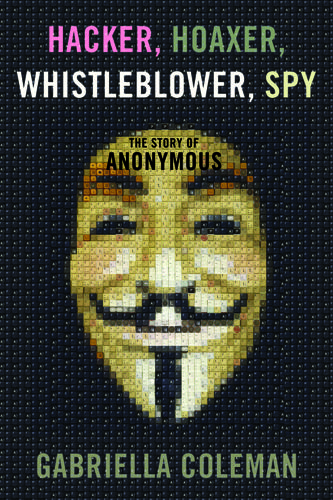
Hacker, Hoaxer, Whistleblower, Spy: The Story of Anonymous
by
Gabriella Coleman
Published 4 Nov 2014
Jude Memorial and Virtual Wake,” The Well, August 1, 2003, last accessed July 6, 2014, available at http://www.well.com/conf/inkwell.vue/topics/190/St-Jude-Memorial-and-Virtual-Wak-page01.html. 21. Spencer Ackerman, “Former NSA chief warns of cyber-terror attacks if Snowden apprehended,” theguardian.com, Aug. 6, 2013. 22. Cory Doctorow, “Prosecutor Stephen Heymann Told MIT that Aaron Swartz Was Like a Rapist Who Blames His Victim,” boingboing.net, Aug. 4, 2013. 23. Hal Abelson, “The Lessons of Aaron Swartz” technologyreview.com, October 4, 2013. 24. Gabriella Coleman, “Gabriella Coleman’s Favorite News Stories of the Week,” techdirt.com, Oct. 12, 2013. 25. Miller McPherson, Lynn Smith-Lovin, and James M Cook, “Birds of a Feather: Homophily in Social Networks,” Annual Review of Sociology, Vol. 27 (2001): 415–44. 26.
…
Thankfully, the sun streaming in through the skylight—the UK was undergoing a rare sunny spell—helped soften the mood. We continued our conversation online. A recurring topic was the morality of the law, unsurprising given his personal experiences with the justice system. One day we discussed another young hacker, Aaron Swartz, who got ensnared by the American legal system. e. Aaron, at the age of twenty-five, was facing decades in prison—thirty-five years—and up to $1 million in fines for downloading a cache of academic journal articles from JSTOR, the scholarly archive that allowed downloads to anybody on MIT’s network.
…
But even if some of his actions were illegal or broke some rules, from a moral standpoint one could say that the downloading of academic articles, many of them researched and written in part with tax dollars, was wholly undeserving of a thirty-five-year sentence and a felony charge—not to mention an expensive trial paid for by taxpayers. Aaron Swartz, forlorn and overwhelmed by the prosecution, ended his life on January 6, 2013. One day, while chatting to Al Bassam about the case, I mentioned an article written by a professor, Hal Abelson, who had chaired a committee investigating MIT’s role in the affair. Abelson absolved MIT and described Swartz as “dangerously naive about the reality of exercising [his technical] power, to the extent that he destroyed himself.”3 Appalled, I responded on a popular techblog: “The true naivety here was Abelson’s.
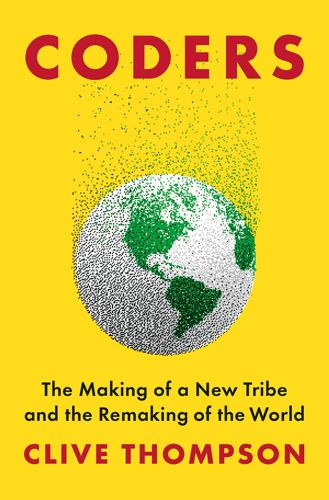
Coders: The Making of a New Tribe and the Remaking of the World
by
Clive Thompson
Published 26 Mar 2019
S15 (February 2017), accessed August 19, 2018, https://www.journals.uchicago.edu/doi/full/10.1086/688697. super-open form of copyright: Tim Carmody, “Memory to Myth: Tracing Aaron Swartz through the 21st Century,” The Verge, January 22, 2013, accessed August 19, 2018, https://www.theverge.com/2013/1/22/3898584/aaron-swartz-profile-memory-to-myth. he committed suicide: Justin Peters, “The Idealist,” Slate, February 7, 2013, accessed August 19, 2018, http://www.slate.com/articles/technology/technology/2013/02/aaron_swartz_he_wanted_to_save_the_world_why_couldn_t_he_save_himself.single.html. “or sectarian infighting”: Coleman, “From Internet Farming.”
…
“It’s been useful to point to documents,” Helsby says. “After Snowden’s documents came out, people understood more. Actually, what became clear is that even the most paranoid of us were understating what was going on.” When we spoke, she was working as the lead coder developing SecureDrop. I ran into Helsby at the Aaron Swartz hackathon in San Francisco. It’s held every fall as a weekend where crypto hackers gather to work on software that, they hope, empowers the average citizen. It’s in commemoration of Swartz, a coder and activist who committed suicide at age 26, but in his too-short life he created projects that are beloved by the hacker community: He helped code the first version of SecureDrop, cofounded Reddit, cocreated RSS—a way for people to make personalized News Feeds online—and helped pioneer the idea of “creative commons” licenses, a hackery super-open form of copyright.
…
After JSTOR and MIT complained, Swartz returned the digital copies to them, and never distributed them online; but the US Department of Justice, apparently looking to make a statement, charged Swartz with computer fraud. Facing penalties of up to $1 million and decades in jail, he committed suicide. “Aaron was persecuted for reading too quickly in a library,” says Brewster Kahle, a cofounder of the Aaron Swartz hackathon along with Lisa Rein, herself a cofounder of Creative Commons. After his MIT hacking days in the ’80s, Kahle made millions with start-ups in the ’90s, then founded the Internet Archive. The Archive makes copies of great swathes of the internet each day to save for posterity, and it also scans everything from old books to vinyl records to video games that are in the public domain, and posts them online: Swartz’s vision made reality, in a way.
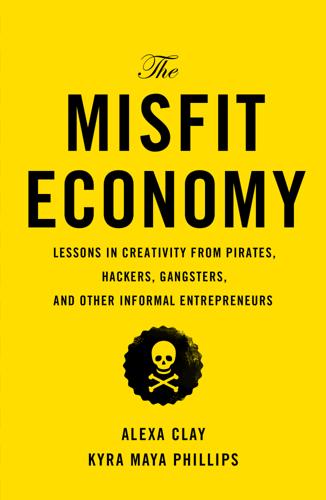
The Misfit Economy: Lessons in Creativity From Pirates, Hackers, Gangsters and Other Informal Entrepreneurs
by
Alexa Clay
and
Kyra Maya Phillips
Published 23 Jun 2015
Kurt Wagner, “Facebook Has a Quarter of a Trillion User Photos,” Mashable, September 17, 2013, http://mashable.com/2013/09/16/facebook-photo-uploads/. 4. HACK 1. Gabriella Coleman, “Our Weirdness Is Free,” Triple Canopy, http://canopycanopycanopy.com/contents/our_weirdness_is_free. 2. Aaron Swartz, “Guerilla Open Access Manifesto,” July 2008, https://archive.org/details/GuerillaOpenAccessManifesto. 3. Official statement from family and partner of Aaron Swartz, http://www.rememberaaronsw.com/memories/. 4. Richard Flanders, If a Pirate I Must Be . . . : The True Story of Bartholomew Roberts—King of the Caribbean (London: Aurum Press, 2008). 5. Peter T. Leeson, The Invisible Hook: The Hidden Economics of Pirates (Princeton, NJ: Princeton University Press, 2011). 6.
…
Without this free access, they believe that you can never really know how a system works from the inside. Naturally, this makes a hacker dedicated to getting his or her hands on information, and anything preventing that is viewed as an unwelcome obstacle. While we were writing this book, news came through of the suicide of Aaron Swartz, a hacker, prolific builder, and warrior for the cause of open and free information. In his tragically short life—he was twenty-six—he cowrote at the age of fourteen the system for Real Simple Syndication (RSS), an innovation essential in the development of Google Reader, a technology that many once utilized every day.
…
Attorney’s office pursued an exceptionally harsh array of charges, carrying potentially over 30 years in prison to punish an alleged crime that had no victims.”3 We may conclude that the prospect of being locked up, like the information Swartz so zealously sought to free, was anathema to his very being. HACK 2.0 While the term “hacker” was traditionally used to refer to those like Sam Roberts, who toyed with computer systems, or Aaron Swartz, who fought to liberate information, the word has taken on broader connotations. We can say that Florence Nightingale hacked the medical profession by creating the vocation of nursing. Martin Luther King, Jr., hacked our political system to fight for civil rights. A child’s mischievous selfie on a parent’s cell phone is playfully captioned “Hacked!”
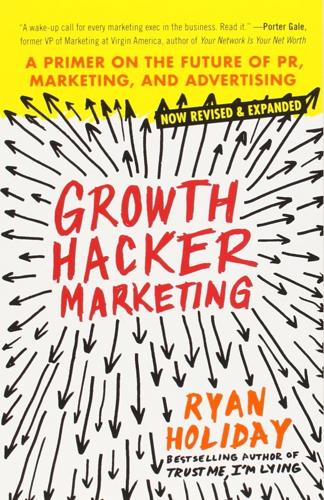
Growth Hacker Marketing: A Primer on the Future of PR, Marketing, and Advertising
by
Ryan Holiday
Published 2 Sep 2013
—Brian Halligan, founder of Hubspot With growth hacking, we begin by testing until we can be confident we have a product worth marketing. Only then do we chase the big bang that kick-starts our growth engine. Without this jump, even the best-designed products and greatest ideas go nowhere. For instance, many people don’t know that the late Aaron Swartz, the genius hacker responsible for Reddit, also invented two other services. In 1999, he started a collaborative encyclopedia before Wikipedia. He started another site called Watchdog.net that was very similar to the wildly popular Change.org. Both were clearly fantastic ideas, predating the actual services we all use today.
…
But for the first year or two it’s a total waste of money.”12 The most insidious part of the traditional marketing model is that “big blowout launch” mythology. Of course, equally seductive is the “build it and they will come” assumption that too many people associate with the web. Both are too simple and rarely effective. Remember what Aaron Swartz realized. Users have to be pulled in. A good idea is not enough. Your customers, in fact, have to be “acquired.” But the way to do that isn’t with a bombardment. It’s with a targeted offensive in the right places aimed at the right people. Your start-up is designed to be a growth engine—and at some point early on that engine has to be kick-started.
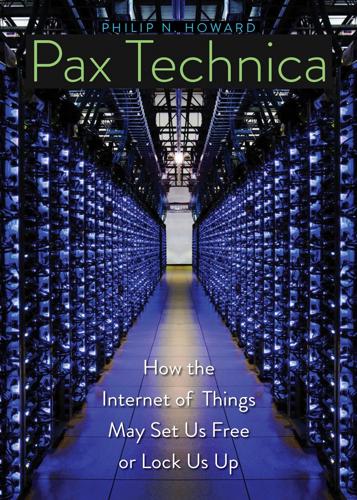
Pax Technica: How the Internet of Things May Set Us Free or Lock Us Up
by
Philip N. Howard
Published 27 Apr 2015
Rebecca MacKinnon, Consent of the Networked: The Worldwide Struggle for Internet Freedom (New York: Basic, 2013). 9. Rebecca MacKinnon, “Keynote Speech on Surveillance,” in Opening Ceremony of the Freedom Online Conference, 2013, accessed September 30, 2014, http://consentofthenetworked.com/2013/06/17/freedom-online-keynote/. 10. “Aaron Swartz,” Wikipedia, accessed June 29, 2014, http://en.wikipedia.org/wiki/Aaron_Swartz. 11. “Russian Business Network,” Wikipedia, accessed June 19, 2014, http://en.wikipedia.org/wiki/Russian_Business_Network. 12. “Zero-Day Attack,” Wikipedia, accessed June 21, 2014, http://en.wikipedia.org/wiki/Zero-day_attack. 13. “U.S.-Style Personal Data Gathering Is Spreading Worldwide,” Forbes, accessed June 29, 2014, http://www.forbes.com/sites/adamtanner/2013/10/16/u-s-style-personal-data-gathering-spreading-worldwide/; Paul Schwartz, Managing Global Privacy (Berkeley: ThePrivacyProjects.org, January 2009), accessed September 30, 2014, http://theprivacyprojects.org/wp-content/uploads/2009/08/The-Privacy-Projects-Paul-Schwartz-Global-Data-Flows-20093.pdf. 14.
…
The Hope and Instability of Hackers and Whistle Blowers We’ve come to depend on hacktivists and whistle blowers to teach us about how this internet of things is evolving. It’s easy to despise Edward Snowden and Chelsea Manning for the perceived breach of trust with their national security colleagues and the armed forces. And industry lobbyists work hard to paint activists like Aaron Swartz as miscreants.10 But it is difficult to ignore the debates these hackers and whistle blowers set in motion. Refusing to address their questions is foolish. They risk breaching the trust of their colleagues, but earn public trust and trigger a much-needed, evidence-based public conversation about what our device networks are being used for.
…
Srđa Popović, the Serb who in 2000 mobilized the resistance to end Slobodan Milošević’s rule, went on in 2003 to train protesters for Georgia’s “Rose Revolution,” Ukraine’s 2005 “Orange Revolution,” and the Maldives’ revolution in 2007, before training activists in Egypt’s April 6 Movement in 2008. Popović’s book Nonviolent Struggle: 50 Crucial Points has been downloaded thousands of times.19 For the presidents of countries and companies, people like Aaron Swartz, Chelsea Manning, and Julian Assange are threats to national security and the corporate bottom line. But in many networks they are heroes. Every few years, hacktivists and whistle blowers turn national security and diplomacy upside down by putting large amounts of previously secret content online.
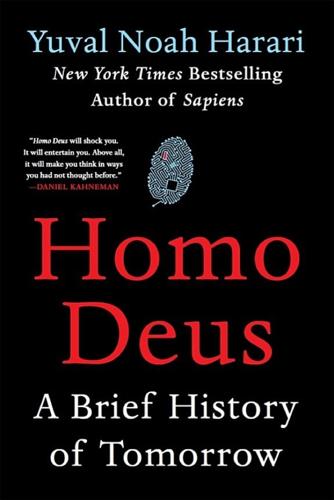
Homo Deus: A Brief History of Tomorrow
by
Yuval Noah Harari
Published 1 Mar 2015
W. Norton, 2003). 6. Aaron Swartz, ‘Guerilla Open Access Manifesto’, July 2008, accessed 22 December 2014, https://ia700808.us.archive.org/17/items/GuerillaOpenAccessManifesto/Goamjuly2008.pdf; Sam Gustin, ‘Aaron Swartz, Tech Prodigy and Internet Activist, Is Dead at 26’, Time, 13 January 2013, accessed 22 December 2014, http://business.time.com/2013/01/13/tech-prodigy-and-internet-activist-aaron-swartz-commits-suicide; Todd Leopold, ‘How Aaron Swartz Helped Build the Internet’, CNN, 15 January 2013, 22 December 2014, http://edition.cnn.com/2013/01/15/tech/web/aaron-swartz-internet/; Declan McCullagh, ‘Swartz Didn’t Face Prison until Feds Took Over Case, Report Says’, CNET, 25 January 2013, accessed 22 December 2014, http://news.cnet.com/8301-13578_3-57565927-38/swartz-didnt-face-prison-until-feds-took-over-case-report-says/. 7.
…
Freedom of information, in contrast, is not given to humans. It is given to information. Moreover, this novel value may impinge on the traditional freedom of expression, by privileging the right of information to circulate freely over the right of humans to own data and to restrict its movement. On 11 January 2013, Dataism got its first martyr when Aaron Swartz, a twenty-six-year-old American hacker, committed suicide in his apartment. Swartz was a rare genius. At fourteen, he helped develop the crucial RSS protocol. Swartz was also a firm believer in the freedom of information. In 2008 he published the ‘Guerilla Open Access Manifesto’ that demanded a free and unlimited flow of information.
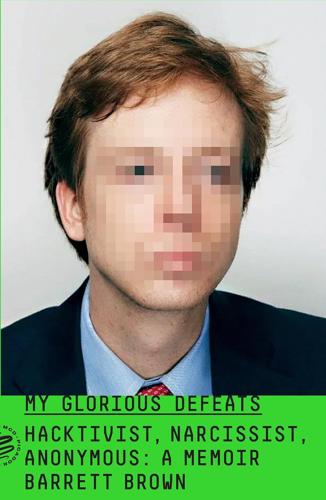
My Glorious Defeats: Hacktivist, Narcissist, Anonymous: A Memoir
by
Barrett Brown
Published 8 Jul 2024
The move astonished even veteran reporters and, thankfully, Magistrate Judge Stickney, who ruled in our favor this time, while still taking pains to assert in his written decision that the prosecutor’s attempt to seize a legal fund that would eventually save taxpayers from having to pay for my defense at all was merely a good-faith attempt to save the taxpayers a portion of the money on my legal defense (years later, another, more competent federal judge would disagree with this obviously nonsensical assessment, but we are anticipating). In January 2013, the information activist and early Reddit developer Aaron Swartz committed suicide. He’d been facing a possible twenty-year sentence for having used his MIT network account to make millions of publicly funded research papers available to the very public that had paid for them. This entirely unnecessary tragedy brought national attention to the DOJ’s habit of pressuring defendants into pleading guilty to lesser crimes by threatening them with inappropriately lengthy sentences if they took the case to trial.
…
Naturally Heath didn’t really want to go into specifics on the various half-truths and irrelevancies she was allegedly protecting me from; instead she had Agent Robert Smith take the stand and provide an hour-long overview of every conversation with every journalist I’d spoken to over the phone since my arrest. Actually quoting from any of these phone calls wouldn’t do; instead, the judge and reporters were treated to Smith’s disingenuous summaries, most notably that Greenwald had told me that he planned to “exploit Aaron Swartz’s death” in his article on my case. Had I felt any remorse, as opposed to embarrassment, for threatening to ruin Smith’s life, and had it somehow outlived the indictment of my mother, it would have dissolved right then and there. Later, Heath complained again about my article for The Guardian, which, as she noted, was “critical of the government.”
…
Tim Rogers, the D Magazine editor for whom I’d been writing the columns (and who had won a National Magazine Award for his 2011 profile of my activities), was called as a surprise witness to testify that, contrary to the FBI’s current position, I was indeed a journalist, regardless of what else I might be. The Wired reporter Quinn Norton—as it happens, a former girlfriend of Aaron Swartz—took the stand and pointed out that she, too, had posted the link for which I alone was apparently to be punished, and explained why using this against me would play havoc with the First Amendment; the prosecutor approached the bench and made some noises about prosecuting her as well, and later seemed to imply that Norton was biased against the DOJ merely due to the fact that the agency had recklessly driven her loved one to suicide.
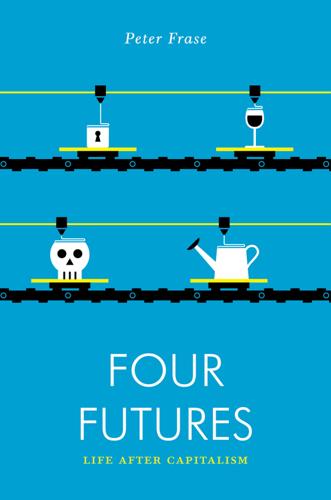
Four Futures: Life After Capitalism
by
Peter Frase
Published 10 Mar 2015
Facing armed guards and a restraining order, he slips the noose only by a clever and convoluted set of corporate legal manipulations that he undertakes on the spot. The notion of armed thugs apprehending people for distributing data over the Internet has only gotten less far-fetched since the novel was written. Macx’s brilliant, idealistic hacker character now evokes the memory of Aaron Swartz, the activist and programmer who killed himself in 2013 at age twenty-six. Swartz was facing crippling legal fees, massive fines, and as much as thirty-five years in prison, all for the crime of downloading too many articles from an academic database. Unlike Manfred Macx, he couldn’t see a way out.
…
And in addition to raw material, Spider must wait for a new season of “maker codes” in order to replicate new things. The anti–Star Trek model solves the problem of how to maintain for-profit capitalist enterprise, at least on the surface. Anyone who tries to supply their needs from their replicator without paying the copyright cartels would become an outlaw, Aaron Swartz or Jammie Thomas-Rasset. But if everyone is constantly being forced to pay out money in licensing fees, then they need some way of earning money, and this brings up a new problem. With replicators around, there’s no need for human labor in any kind of physical production. So what kind of jobs would exist in this economy?
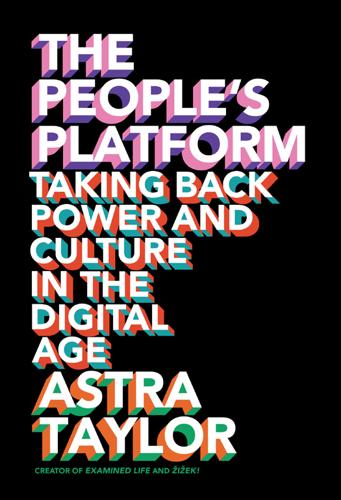
The People's Platform: Taking Back Power and Culture in the Digital Age
by
Astra Taylor
Published 4 Mar 2014
Instead of the defensive obsession with ownership, we should foster an ethos of stewardship: a steward preserves and protects, looking both forward and back, tending to what is not his. On the issue of economic sustenance, we might take some inspiration from the mounting push for open access to federally financed scholarship, a cause made more visible by the programmer and progressive activist Aaron Swartz, whose prosecution by the Department of Justice for downloading copyrighted documents from the nonprofit academic database JSTOR led him to commit suicide in 2013 (Swartz never shared the documents and JSTOR tried to get the charges dropped).42 In the wake of this tragedy, the White House Office of Science and Technology Policy issued a memorandum instructing federal agencies of a certain size to develop plans to make research they have supported freely available: “citizens deserve easy access to the results of research their tax dollars have paid for,” the program’s director declared.
…
While there were points in the copyright debate where we disagreed, our social ideals generally overlapped, for Aaron believed that open access and the open Internet needed to coexist with sustained left-leaning political activism and attention to issues like power, inequality, and privilege. For a summary of Aaron’s travails with JSTOR and MIT and harassment by government authorities, see Wesley Yang, “The Life and Afterlife of Aaron Swartz,” New York magazine, February 8, 2013. For insight into Aaron’s complicated perspective, read his critique of the open data movement, “A Database of Folly,” CrookedTimber.org, July 3, 2012, http://crookedtimber.org/2012/07/03/a-database-of-folly/. 6: DRAWING A LINE 1. Quoted in John F. Kasson, Civilizing the Machine: Technology and Republican Values in America, 1776–1900 (New York: Hill and Wang, 1999), 24. 2.
…
There are too many folks to name everyone who played a crucial role but Jeff, Tara, Sunaura, Laura Hanna, Colin Robinson, Beka Economopoulos, Jason Jones, Elizabeth Stark, Josh MacPhee, Rebecca Solnit, Rebecca Gates, Bretton Fosbrook, and Sarah Resnick deserve to be singled out. Two friends and passionate activists, Dara Greenwald and Aaron Swartz, engaged with me about material that made it into these pages, and both passed away, leaving the world a poorer place. I’m grateful to Blue Mountain Center for space to think and to the Baffler and Thomas Frank for giving me a forum to test some of my early ideas in essay form, much of which has been woven into this book.
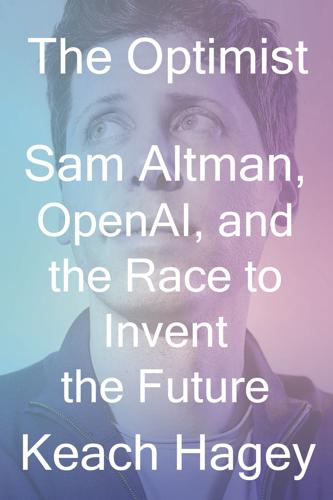
The Optimist: Sam Altman, OpenAI, and the Race to Invent the Future
by
Keach Hagey
Published 19 May 2025
“Honorees of the 2014 Veterans Parade: David Livingston,” Wicked Local, May 18, 2014. 18.Paul Graham, “A Unified Theory of VC Suckage,” PaulGraham.com, March 2005. 19.Tom Nicholas, VC: An American History (Cambridge, MA: Harvard University Press, 2019), 1–2. 20.Jessica Livingston, “Grow the Puzzle Around You,” Posthaven, June 30, 2018. 21.Livingston, Founders, 447. 22.Graham, “How to Start a Startup.” 23.Livingston, “Grow the Puzzle,” Posthaven. 24.Randal Stross, The Launch Pad: Inside Y Combinator (New York: Portfolio/Penguin, 2012), 3. 25.Justin Kan, “My Y Combinator Interview,” A Really Bad Idea Blog, November 24, 2010. 26.Aaron Swartz, “SFP: Come See Us,” Aaron Swartz’s blog. 27.Lagorio-Chafkin, Nerds, 37–38. 28.Matthew Lynley, “How a Site That Streams People Playing Video Games Became a Billion Dollar Business,” BuzzFeed, August 7, 2014. 29.Kan, “My Y Combinator Interview.” 30.Swartz, “SFP: Come See us.” 31.Ryan Singel, “Stars Rise at Startup Summer Camp,” Wired, September 13, 2005. 32.Melissa Block, “Sprint Born from Railroad, Telephone Businesses,” NPR, October 15, 2012. 33.Livingston, Founders, 450. 34.
…
In the early days of Google, he was the first “Paul” it surfaced, ahead of the Beatle and the apostle; to this day, his essays are near the top if one searches the word “essays.” “Pretty much everything he does is featured on Slashdot, which is sort of like The New York Times of the computer world—everybody reads it,” Aaron Swartz told The Stanford Daily that spring.6 Like Altman, Swartz was a nineteen-year-old founder from Stanford bound for the program, except Swartz was already tech-world famous for having helped create the popular RSS-feed format at age fourteen. The investment aside, mentorship by Graham would be priceless.
…
At this point in the essay, Alexander realizes that it sounds like he’s saying humankind could have the chance to create or replace God. He doesn’t deny it. “To expect God to care about you or your personal values or the values of your civilization, that’s hubris,” he writes. “I am a transhumanist because I do not have enough hubris not to try to kill God.”26 _________________ * Aaron Swartz, who had joined Reddit as a co-founder in a kind of Graham-officiated shotgun wedding, had been fired in 2007 after struggling to adapt to corporate life. He went on to become an activist for copyright reform and open access to information, and hanged himself in 2013 while facing federal hacking charges and the possibility of decades of jail time for downloading a large trove of academic papers from MIT.
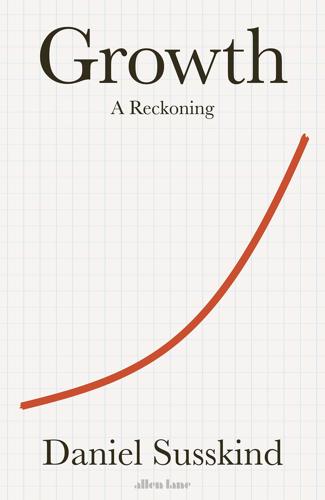
Growth: A Reckoning
by
Daniel Susskind
Published 16 Apr 2024
The answer is that large companies – with clear strategies, deep pockets and lobbying power – have been able to tip the balance of the IP regime in their favour, whereas the many individual users of ideas, fragmented and uncoordinated, have not. This implies that a far greater countervailing force is required from society to push the balance in the other direction. At the start of the internet era, a group of academics and activists – Larry Lessig, James Boyle and Aaron Swartz, among others – noted both the importance of the moment and its fragility. The combination of internet technology and the peculiar properties of ideas, they recognized, could lead to an explosion in the creation of new ideas; yet this flourishing could easily be frustrated if the restrictive spirit of traditional property rights, developed for the tangible world, was imposed unreformed on the intangible world of ‘cyberspace’.
…
Now is the time to fire it up again. If the birth of the internet provided the initial energy for the movement, then the challenge of our present moment – the need to create far more ideas, more technological progress and more growth – should be harnessed to do the same. The legacy of one of those individuals – Aaron Swartz – is particularly important. Swartz was brilliant. By his early twenties he was an iconic programmer, entrepreneur (creator of RSS and cofounder of Reddit), and a philosopher-activist with a cult following. His colourful life, coupled with his unusual sense of purpose so early on, was celebrated by many great minds of our time.
…
Published online. 35 Caroline Kitchener, ‘Mentorship Cut Short by Suicide’, The Atlantic, 24 August 2017; Lawrence Lessig on Democracy Now!, 14 January 2013, www.youtube.com/watch?v=z57Im9XAFfU. 36 gist.github.com/usmanity/4522840. 37 Lawrence Lessig interview with Walled Culture, 2 December 2021, walledculture.org/interview-lawrence-lessig-internet-architecture-remix-culture-creative-commons-nfts-aaron-swartz-and-the-internet-archive/. 38 Tyler Cowen, Stubborn Attachments (San Francisco: Stripe Press, 2018), p. 122. 39 OECD (2022) data. 40 Prableen Bajpai, ‘Which Companies Spend the Most in Research and Development?’, Nasdaq, 21 June 2021, www.nasdaq.com/articles/which-companies-spend-the-most-in-research-and-development-rd-2021-06-21. 41 www.gov.uk/government/news/allocations-announced-for-record-level-25-billion-rd-budget#:~:text=UKRI%20’s%20Research%20%26%20Development%20budget,agenda%20through%20its%209%20councils. 42 Gruber and Johnson, quoted in ‘The Case for More State Spending on R&D’, The Economist, 16 January 2021. 43 ‘The Case for More State Spending on R&D. 44 ‘The Case for More State Spending on R&D’ chuvpilo.medium.com/whos-ahead-in-ai-research-in-2020-2009da5cd799. 45 Tim Fernholz, ‘NASA Has Always Needed Private Companies to Go to the Moon’, QZ, 24 June 2021. 46 These examples are from Alex Knapp, ‘Apollo 11’s 50th Anniversary: The Facts and Figures Behind the $152 Billion Moon Landing’, Forbes, 20 July 2019. 47 See Mariana Mazzucato, The Entrepreneurial State (London: Anthem Press, 2013) and Mariana Mazzucato, ‘It’s a Myth that Entrepreneurs Drive New Technology’, Slate, 1 September 2013. 48 www.census.gov/library/stories/2021/12/net-international-migration-at-lowest-levels-in-decades.html. 49 Stuart Anderson, ‘Immigrants and Billion-Dollar Companies’, National Foundation for American Policy Brief (2018); ‘Tech Immigrants: A Map of Silicon Valley’s Imported Talent’, Bloomberg, 6 June 2014. 50 Thanks to @scienceisstrat1 for a terrific Twitter thread capturing these statistics.
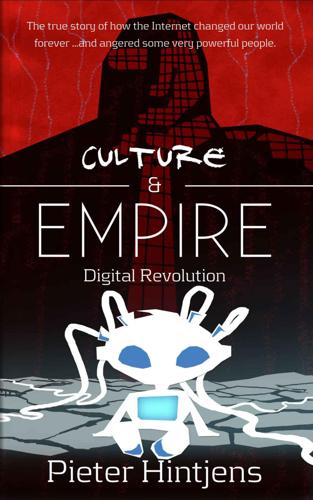
Culture & Empire: Digital Revolution
by
Pieter Hintjens
Published 11 Mar 2013
It is a classic lawyer's game: you define a term, and then I will make it mean precisely the opposite, with the fewest court cases possible. It is bad science to gather data to support a hypothesis, and it is bad justice to twist a law to support a prosecution. In April 2013, Cory Doctorow wrote, of the US Department of Justice (DoJ)'s persecution of the young activist Aaron Swartz, the archetype of a Dangerous Young Man: When my friend Aaron Swartz committed suicide in January, he'd been the subject of a DoJ press-release stating that the Federal prosecutors who had indicted him were planning on imprisoning him for 25 years for violating the terms of service of a site that hosted academic journals. Aaron had downloaded millions of articles from that website, but that wasn't the problem.
…
Ironically, for a long time, the NSA was seen as one of the best places to work, if you were a smart technology-oriented nerd with particular talents. For years, the agency cultivated its image as the quiet force for good, the honest policemen of the Internet. It proposed "stronger" (hah!) security standards and pushed them through US and international standards organizations. Young men like Aaron Swartz were the best possible talent the agency could ask for, to keep the Internet safe for Honest Citizens. Glyn Moody writes, "as the NSA is now finding out, those same hackers are increasingly angry with the legal assault on both them and their basic freedoms." In his "nihilists and anarchists" speech, Hayden made it clear that he considered the "twenty-somethings" to be the next terrorists: Mr Snowden has created quite a stir among those folks who are very committed to global transparency and the global web, kind of ungoverned and free.
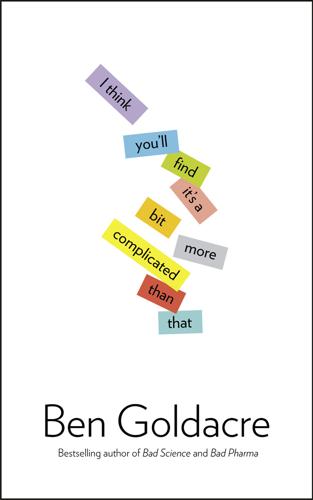
I Think You'll Find It's a Bit More Complicated Than That
by
Ben Goldacre
Published 22 Oct 2014
There are open-access alternatives, where academics pay up-front and the paper is free to all readers, but these are patchy, and require your funder to pay £1,000 per paper. If the journal your work is best suited for doesn’t do open access, then you might reasonably accept a closed-access journal. The arguments are big. What I find interesting is the recent rise of direct action on this issue. Aaron Swartz is a fellow at Harvard’s Center for Ethics, and a digital activist. He has been accused of intellectual property theft on a grand scale, and the federal indictment document, available in full online, describes an inspiringly nerdy game of cat and mouse. Swartz denies all charges. Allegedly, he bought a laptop to harvest academic papers from the website JSTOR.
…
My hunch is that, at some stage, this problem may be partially sidestepped when someone manages an illegal workaround that individuals can play with, but which no university could endorse. I may be wrong, but either way, these are very interesting times for information. In January 2013, facing up to thirty-five years in jail for downloading large quantities of academic papers, and under enormous pressure from US prosecutors, Aaron Swartz took his own life. He was twenty-six and extraordinary. A documentary from 2014 about Aaron’s life – The Internet’s Own Boy – is very good, very upsetting, and free to download online. BIOLOGISING Neuro-Realism Guardian, 30 October 2010 When the BBC tells you, in a headline, that libido problems are in the brain and not in the mind, then you might find yourself wondering what the difference between the two is supposed to be, and whether a science article can really be assuming – in 2010 – that readers buy into some strange form of Cartesian dualism, in which the self is contained by a funny little spirit entity in constant pneumatic connection with the corporeal realm.
…
Here’s Some Direct Action Academic Papers are Hidden: http://www.badscience.net/2011/09/academic-papers-are-hidden-from-the-public-heres-some-direct-action/ piece on academic publishers: http://www.guardian.co.uk/commentisfree/2011/aug/29/academic-publishers-murdoch-socialist pay up front: http://www.timeshighereducation.co.uk/story.asp?sectioncode=26&storycode=417266&c=1 Aaron Swartz: http://blog.demandprogress.org/2011/07/federal-government-indicts-former-demand-progress-executive-director-for-downloading-too-many-journal-articles/ federal indictment document online: http://web.mit.edu/bitbucket/Swartz,Aaron Indictment.pdf harvest academic papers from JSTOR: http://about.jstor.org/news-events/news/jstor-statement-misuse-incident-and-criminal-case Pirate Bay: http://thepiratebay.org/torrent/6554331/Papers_from_Philosophical_Transactions_of_the_Royal_Society__fro Royal Society Papers: http://royalsociety.org/about-us/reporting/ BIOLOGISING Neuro-Realism Neuro-Realism: http://www.badscience.net/2010/10/neuro-realism/ When the BBC tells you: http://www.bbc.co.uk/news/health-11620971 ‘normal’ sex drive http://amzn.to/doM9h8 ‘hypoactive sexual desire disorder’: http://en.wikipedia.org/wiki/Hypoactive_sexual_desire_disorder tells the Mail: http://www.dailymail.co.uk/news/article-1323730/Is-women-dont-like-make-love-Scientists-discover-low-libidos-behave-differently.html In the Metro: http://www.metro.co.uk/lifestyle/845156-women-with-low-sex-drive-have-different-brains ‘fMRI in the Public Eye’: http://www.ncbi.nlm.nih.gov/pmc/articles/PMC1524852/ The Stigma Game The Stigma Game: http://www.badscience.net/2010/10/pride-and-prejudice/ looked for chromosomal deletions: http://dx.doi.org/10.1016/S0140-6736%2810%2961109-9 including that in the Guardian: http://www.guardian.co.uk/society/2010/sep/30/hyperactive-children-genetic-disorder-study said Professor Anita Thapar: http://www.guardian.co.uk/society/2010/sep/30/hyperactive-children-genetic-disorder-study Read and Harre: http://informahealthcare.com/doi/abs/10.1080/09638230123129 Read and Law: http://isp.sagepub.com/content/45/3/216.full.pdf+html Walker and Read: http://www.ncbi.nlm.nih.gov/pubmed/12530335 Dietrich and colleagues: http://onlinelibrary.wiley.com/doi/10.1111/j.1440-1614.2004.01363.x/abstract review of the literature to date: http://onlinelibrary.wiley.com/doi/10.1111/j.1600-0447.2006.00824.x/full ‘Genetic Bases of Mental Illness’: http://dx.doi.org/10.1016/S0166-2236%2802%2902209-9 Pink, Pink, Pink, Pink.
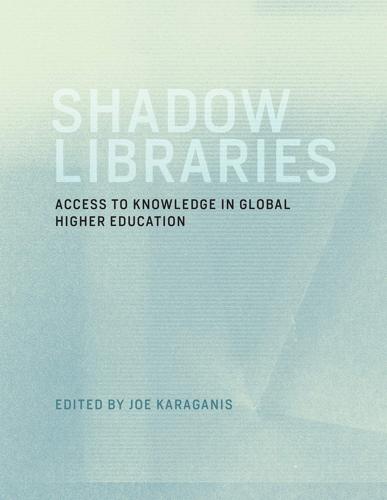
Shadow Libraries: Access to Knowledge in Global Higher Education
by
Joe Karaganis
Published 3 May 2018
In contrast, “open educational resources”—generally abbreviated to OER—have made only limited progress in the general curriculum and remain a novelty in the world of scholarly books (Crossick 2016; Wolff, Rod, and Schonfeld 2016). The slow, uneven pace of these developments provides a context for impatient projects like Sci-Hub and the “guerilla open access” efforts of activists like Aaron Swartz, who was prosecuted for unauthorized bulk downloading of academic articles from the JSTOR database.4 As evolving closed, open, and informal models shape the landscape for research and instructional materials, the borders between them have become complex—crisscrossed by different pricing models, definitions of openness, institutional cultures, varied and often poorly defined flexibilities in copyright law, and a wide array of tolerated, assumed, and asserted uses.
…
. […] The target groups for LibGen are poors: Africa, India, Pakistan, Iran, Iraq, China, Russia and post-USSR etc., and on a separate note, people who do not belong to academia. If you are not at a university, you can’t access anything or at least your access will be so much troubled that you won’t be able to progress at all. It is easy to see parallels between LibGen and the agenda of someone like Aaron Swartz in the United States, whose Guerilla Open Access Manifesto touched on many of the same themes in 2008. (Swartz committed suicide in 2013 while under investigation for the unauthorized downloading of large parts of the JSTOR catalog of academic articles). As the technologically possible library surpasses the modest reality and uneven distribution of actual libraries, this sense of relative deprivation can readily become a politics.
…
One of the most violent avatars of this injunction can be found in the ancient Hindu text which dictates that “if a shudra [the lowest caste] intentionally listens to the vedas [hymns] in order to commit them to memory, then his ears should be filled with (molten) lead and lac; if he utters the veda, then his tongue should be cut off; if he has mastered the veda his body should be cut to pieces.” (Manusmrithi n.d., XII.4)5 The Social and Political Life of Books These kinds of injunctions are still with us, if in less gruesome form, and they continue to produce tragic avatars. The story of Aaron Swartz, a young man hounded to suicide by government prosecutors for the crime of downloading thousands of academic articles should remind us of their continuing force. Such punishments point to one of the major conflicts described in this study: law and interdiction on the side of the gatekeepers of knowledge, and the power of human curiosity and auto-didacticism among those outside the gates.

Abolish Silicon Valley: How to Liberate Technology From Capitalism
by
Wendy Liu
Published 22 Mar 2020
TWELVE: EPILOGUE Growing up, I slowly had this process of realising that all the things around me that people had told me were just the natural way things were, the way things always would be — they weren’t natural at all. They were things that could be changed, and they were things that, more importantly, were wrong and should change, and once I realised that, there was really no going back. — Aaron Swartz, a computer programmer and political activist who was prosecuted by the US government in 2011 for systematically downloading academic journals in protest of intellectual property restrictions; in 2013, he took his own life.1 So what now? None of what I’ve suggested in the previous chapter will be easy, and the overall arc will require coordination from many actors pushing in the same direction.
…
by Chris Baraniuk for Scientific American, published May 31, 2018 at https://www.scientificamerican.com/article/where-will-the-ad-versus-ad-blocker-arms-race-end/. 22 See “Building a Socialist Media System” by Leo Watkins, Tom Mills, and Dan Hind for New Socialist, published September 18, 2019 at https://newsocialist.org.uk/building-socialist-media-system/. 23 See “Game Developers Need to Unionize” by Tim Colwill for Polygon, published January 16, 2019, at https://www.polygon.com/2019/1/16/18178332/game-developer-union-crunch. 24 As an example, see French game studio Motion Twin, which describes itself as an anarcho-syndical workers cooperative. Twelve: Epilogue 1 The quote is transcribed from a video interview with Ruairí McKiernan, published January 12, 2010 at https://www.ruairimckiernan.com/articles1/my-interview-with-internet-activist-aaron-swartz-1986-2013. ACKNOWLEDGEMENTS The first acknowledgement has to be to Repeater Books, for making this book come to life. Tariq, I still don’t know what made you take a chance on me with a book deal, but I’m grateful nonetheless, and I’m glad that the book I ended up writing so closely mirrored the book you had in mind.
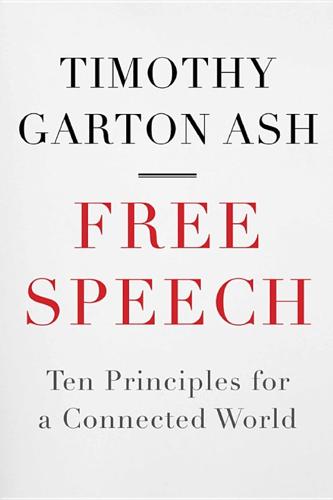
Free Speech: Ten Principles for a Connected World
by
Timothy Garton Ash
Published 23 May 2016
The US Attorney’s Office Massachusetts, ‘Alleged Hacker Charged with Stealing over Four Million Documents from MIT Network’, 19 July 2011, http://perma.cc/HL6U-99UX. MIT commissioned a report by a group led by computer scientist Hal Abelson, which gives a detailed account, and asks what lessons MIT should learn: ‘Report to the President: MIT and the Prosecution of Aaron Swartz’, http://perma.cc/QL4D-PYPE 41. Aaron Swartz, ‘Guerilla Open Access Manifesto’, http://perma.cc/CHA9-PAL2 42. see http://creativecommons.org/choose/ 43. ‘Copyright & Attribution’, Free Speech Debate, http://freespeechdebate.com/en/copyright-attribution/ 44. on the Digital Public Library, see Darnton, ‘The National Digital Public Library Is Launched!’
…
The richest university in the world, Harvard, called on its scholars to make their work available in open-access journals, saying that its library could no longer afford the $3.5 million annual bill payable to the likes of Elsevier.36 The British government demanded that the results of any publicly funded research should be made freely available to the public and commissioned a report on the best way to cover the editorial, peer-review and production costs of academic publications.37 Tragically, this battle over intellectual property claimed the life of a brilliant young man. Aaron Swartz, an American computing prodigy, co-developed Reddit, an online bulletin board which by 2015 clocked more than 150 million unique monthly visitors viewing more than six billion pages. He was involved in pioneering the widely used RSS web feed, worked with Tim Berners-Lee to improve data sharing through the Semantic Web and with cyberlaw guru Lawrence Lessig on the Creative Commons licences.
…
The Harvard Library, ‘Faculty Advisory Council Memorandum on Journal Pricing’, http://perma.cc/WJD2-Y7H4 37. Janet Finch, ‘Accessibility, Sustainability, Excellence: How to Expand Access to Research Publications’, Report of the Working Group on Expanding Access to Published Research Findings, June 2012, http://perma.cc/HQ4X-6Z2E 38. see David Amsden, ‘The Brilliant Life and Tragic Death of Aaron Swartz’, Rolling Stone, 15 February 2013, http://perma.cc/DZN2-GGUC. Latest Reddit figures at http://www.reddit.com/about/ 39. see http://theinfo.org/. At this writing, at least some of them are still viewable there, intriguingly displayed as rows of clickable dots 40. The US Attorney’s Office Massachusetts, ‘Alleged Hacker Charged with Stealing over Four Million Documents from MIT Network’, 19 July 2011, http://perma.cc/HL6U-99UX.
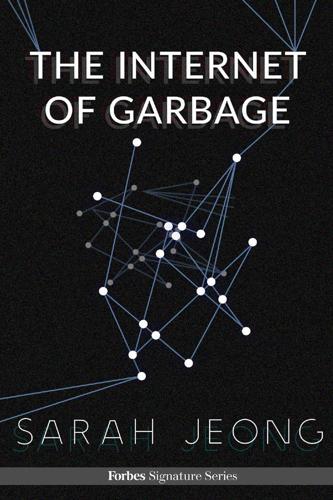
The Internet of Garbage
by
Sarah Jeong
Published 14 Jul 2015
CONCLUSION: THE TWO FUTURES OF ANTI-HARASSMENT Building a community is pretty tough; it requires just the right combination of technology and rules and people. And while it’s been clear that communities are at the core of many of the most interesting things on the Internet, we’re still at the very early stages of understanding what it is that makes them work.” — Aaron Swartz, September 14, 2006 “Online anonymity isn’t responsible for the prevalence of horrible behavior online. Shitty moderation is.” — Zoe Quinn, March 21, 2015 I’ve discussed the shape of the problem—harassment as a spectrum of behaviors; harassment as a spectrum of content; and the effect of harassment on larger ecosystems of speech.

Doing Time Like a Spy
by
John Kiriakou
Published 11 May 2017
Not all of them were prosecuted and not all were whistleblowers, however, their contributions toward whistleblowing are significant enough to be included in the group: Philip Agee, Daniel Ellsberg, Julian Assange, Jeremy Hammond, Thomas Drake, John Kiriakou, Jeffrey Sterling, Aaron Swartz, Chelsea Manning, Edward Snowden. johndinglerart.com (Philip Agee served as a role model for other whistleblowers; Jeremy Hammond and Aaron Swartz were facilitators.) 10 9 8 7 6 5 4 3 2 1 Publisher’s Cataloging-in-Publication data Names: Kiriakou, John, author. Title: Doing time like a spy : how the CIA taught me how to survive and thrive in prison / John Kiriakou.
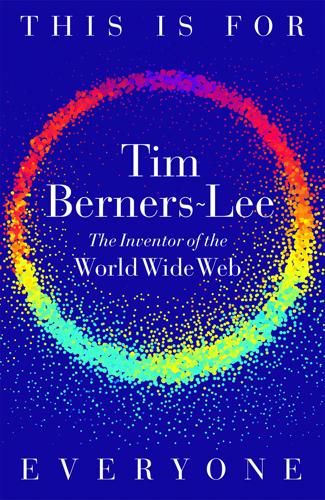
This Is for Everyone: The Captivating Memoir From the Inventor of the World Wide Web
by
Tim Berners-Lee
Published 8 Sep 2025
A mobile web app, powered by an open government data portal we helped to design, delivered results from twenty-one districts within hours of the polls closing. The result was Burkina Faso’s first-ever democratic transition. • The web community had a number of allies in our fight for open data. One of the most important was the activist and hacker Aaron Swartz. Aaron had co-founded Reddit, but he found corporate life uncongenial and had taken up the crusade for a liberated internet. He spent a lot of time at the MIT campus and I was one of his mentors. He attended semantic web meetings, and he’d often come for lunch in my office. He was lively, intelligent and connected, with wonderful enthusiasm.
…
Images here, here, here and here © CERN Image here © Punch Cartoon Library/TopFoto Image here courtesy of the National Center for Supercomputing Applications (NCSA) and the Board of Trustees of the University of Illinois Image here © Yahoo Image here: Internet (Collection ‘“Mes Premières Découvertes’”) by Gallimard Jeunesse, Jean-Philippe Chabot and Donald Grant © Gallimard Jeunesse Image here from The New York Times, 12 November © 1996 The New York Times. All rights reserved. Used by permission and protected by the Copyright Laws of the United States. The printing, copying, redistribution, or retransmission of this Content without express written permission is prohibited Index Aadhaar ref1 Aaron, Swartz ref1 Abou-Zahra, Shadi ref1, ref2 Abramatic, Jean-François ref1 academic papers, JSTOR ref1 accessibility ref1, ref2, ref3, ref4, ref5, ref6 ActiveX ref1 activism, hostile (Edelman Trust Barometer) ref1 Adam Smith lecture ref1 addiction, social media ref1, ref2, ref3, ref4 Addis, Louise ref1 Adelman, Len ref1 Adobe ref1 advertisements browsers ref1 cookies ref1 first clickable ref1, ref2 microtargeting ref1, ref2 pop-up ref1 privacy ref1 social media ref1, ref2, ref3 third-party distribution networks ref1, ref2 affordability ref1 Africa ref1, ref2, ref3 agents ref1, ref2, ref3, ref4 AJAX platform ref1 Akamai Technologies ref1, ref2 al-Sisi, Abdel Fattah ref1 Alexa ref1, ref2 Alexa Internet ref1 Alexander, Helen ref1 algorithms consistent hashing ref1 PageRank ref1 public key cryptography ref1 social media ref1, ref2, ref3, ref4, ref5, ref6 Alibaba ref1, ref2 Alice in Wonderland (Carroll) ref1 ‘alignment problem’ ref1 AlphaFold ref1, ref2 AlphaGo ref1 AlphaZero ref1 AltaVista ref1, ref2 ‘always on’ ref1 Amazon ref1, ref2, ref3, ref4, ref5, ref6 Andreessen Horowitz venture-capital fund ref1 Andreessen, Marc ref1, ref2, ref3, ref4, ref5, ref6, ref7 Android ref1 Anklesaria, Farhad ref1 Anonymous ref1 AOL ref1, ref2, ref3, ref4 AOL hometown ref1 Apache HTTP servers ref1 Apollo naming system ref1, ref2 Apple anti-trust lawsuits ref1 apps ref1 business model ref1 HyperCard ref1 interoperability ref1 iPhone ref1, ref2, ref3 Jobs leaves ref1 Jobs returns ref1 partnerships ref1 Siri ref1 standards ref1 WHATWG ref1, ref2, ref3 Applied Semantics ref1 apps interoperability ref1, ref2 killer apps ref1 smartphones ref1 web apps ref1 Arab Spring ref1 Archer, Mary ref1 archives ref1, ref2 Arena browser ref1, ref2 ARPANET ref1 Arroyo, James ref1 artichokes ref1 artificial intelligence (AI) AI ‘agents’ ref1, ref2, ref3 ‘AI winter’ ref1, ref2 authors and musician’s concerns ref1 autonomy ref1 Charlie ref1, ref2 copyright infringement ref1 DeepMind ref1 Ditchley Summit ref1, ref2, ref3 early development ref1 future possibilities ref1, ref2 global summits ref1 GOFAI ref1 GPTs (Generative Pre-trained Transformers) ref1, ref2, ref3, ref4, ref5 ‘human in the loop’ ref1 Inflection.AI ref1 intention economy ref1 military applications ref1 need for inclusivity ref1 neural networks ref1, ref2, ref3, ref4 OpenAI ref1, ref2, ref3, ref4, ref5 paradigm shift ref1 RAGs (Retrieval-Augmented Generation systems) ref1 reinforcement learning from human feedback ref1 search engines ref1 semantic web ref1 simplified text ref1 singularity ref1 speed of development ref1 superintelligence ref1 trust ref1 see also ChatGPT Asimov, Isaac ref1, ref2, ref3, ref4 Association for Computing Machinery (ACM) ref1 atheism ref1, ref2 Athumi ref1 Atkinson, Bill ref1 Attenborough, David ref1 attention economy ref1, ref2, ref3, ref4 attention spans ref1 audio descriptions ref1 audiobooks ref1 augmented reality ref1 Australia ref1, ref2, ref3 authentication ref1 authoritarians ref1, ref2, ref3, ref4 Autodesk ref1 Baidu ref1 bar-code scanners ref1 Barabasi, Albert-Laszlo ref1 Barlow, John Perry ref1, ref2, ref3 Barton, Nick ref1, ref2 BBC ref1, ref2, ref3 Beihang University, Beijing ref1, ref2 Beijing ref1 Belgium ref1, ref2 Bell Labs ref1 Bellingcat organization ref1 Bengio, Yoshua ref1 Berkman Klein Center for Internet and Society ref1, ref2 Berners-Lee, Alice (daughter) ref1, ref2, ref3, ref4 Berners-Lee, Ben (son) ref1, ref2, ref3, ref4, ref5 Berners-Lee, Conway (father) ref1, ref2, ref3, ref4, ref5 Berners-Lee, Mary Lee (mother) ref1, ref2, ref3, ref4, ref5, ref6, ref7 Berners-Lee, Rosemary see Leith, Rosemary Berners-Lee, Tim awards ref1, ref2, ref3, ref4, ref5, ref6 character ref1, ref2, ref3 childhood and education ref1, ref2, ref3, ref4 children ref1, ref2, ref3, ref4, ref5, ref6, ref7, ref8 cottage in Wales ref1 D.G.
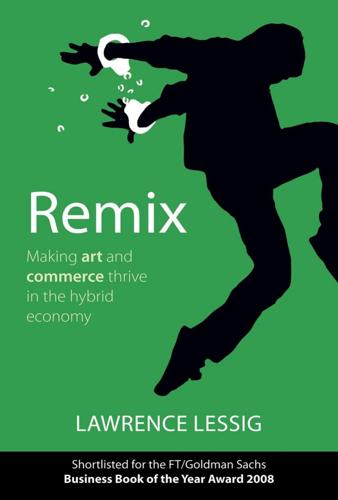
Remix: Making Art and Commerce Thrive in the Hybrid Economy
by
Lawrence Lessig
Published 2 Jan 2009
And even here, more of the work is done by a relatively small number of users. According to Jimmy Wales, 50 percent of all edits are done by 0.7 percent of users—meaning just about 524 users within his sample. The most active 2 percent (1,400) of users have done 73.4 percent of all edits. Counting content, Aaron Swartz found that “the vast majority of major contributors are unregistered and that most have only made a handful of contributions to Wikipedia.”50 This division of work is not directed. There’s no “chore” norm at Wikipedia. As Wales describes, 80706 i-xxiv 001-328 r4nk.indd 158 8/12/08 1:55:28 AM T W O EC O NO MIE S: C O MMERC I A L A ND SH A RING 159 If somebody says, “Well, I know about birds and I’m going to come in and monitor a few hundred bird articles and I’m going to occasionally update them when I feel like it but I’m in and out and I’m not really a core community member.
…
Pink, “The Book Stops Here,” Wired, March 2005, available at link #70. 48. All quotes from Jimmy Wales taken from an in-person interview conducted May 4, 2007. 49. Seth Anthony, “Contribution Patterns Among Active Wikipedians: Finding and Keeping Content Creators,” Wikimania Proceedings SA1 (2006), as summarized at link #71 (last visited August 20, 2007). 50. Aaron Swartz, “Who Writes Wikipedia,” available at link #72 (last visited August 20, 2007). 51. “Meetings/February 7, 2005,” Wikimedia Foundation, available at link #73 (last visited July 31, 2007). 52. Tapscott and Williams, Wikinomics, 72. 53. Ibid. 54. Noam Cohen, “The Latest on Virginia Tech, from Wikipedia,” New York Times, April 23, 2007. 55.
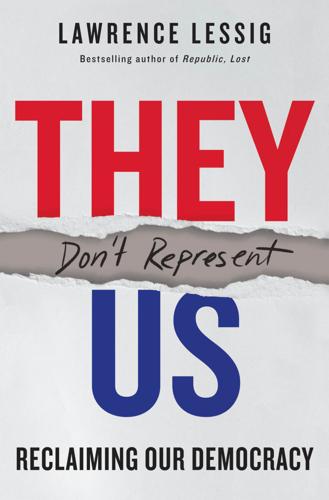
They Don't Represent Us: Reclaiming Our Democracy
by
Lawrence Lessig
Published 5 Nov 2019
There’s a parallel here with the fight about so-called intellectual property. A copyright may be your property, just as a car may be your property. But stealing the one is very different from stealing the other. Sloppy language sometimes obscures that difference. As U.S. attorney Carmen Ortiz said, as she threatened Aaron Swartz with a thirty-five-year jail term for downloading too many academic journal articles from the online database JSTOR, “stealing is stealing whether you use a computer command or a crowbar.”96 But that statement is just absurd. A crowbar does damage almost every time it is used to “steal”; a computer command rarely does.
…
“Skype Translator Preview—An Exciting Journey to a New Chapter in Communication,” Skype, December 15, 2014, available at link #125. Microsoft assures users that no personally identifiable data is gathered from Skype and that the data is not used for advertising. “Skype Translator Privacy FAQ,” Skype, available at link #126. 96.Andrew C. Oliver, “In Memory of Aaron Swartz: Stealing Is Not Stealing,” InfoWorld, January 17, 2013, available at link #127. 97.Zuboff, Surveillance Capitalism, 521. 98.Zuboff, Surveillance Capitalism, 92. 99.Zuboff, Surveillance Capitalism, 339–40. 100.Zuboff, Surveillance Capitalism, 451. 101.Chris Nodder, Evil by Design: Interaction Design to Lead Us into Temptation (Indianapolis, IN: John Wiley, 2013). 102.Steve Henn, “Online Marketers Take Note of Brains Wired for Rewards,” NPR, July 24, 2013, available at link #128. 103.Hayley Tsukayama, “Video Game Addiction Is a Real Condition, WHO Says.
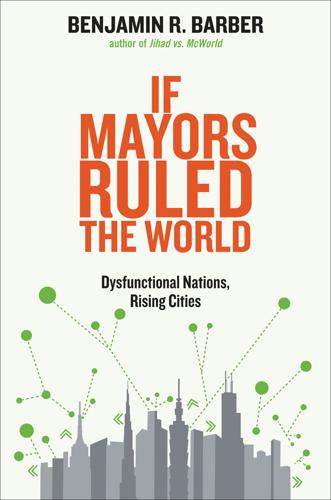
If Mayors Ruled the World: Dysfunctional Nations, Rising Cities
by
Benjamin R. Barber
Published 5 Nov 2013
Put The Civic Web: Online Politics and Democratic Values next to Jaron Lanier’s You Are Not a Gadget: A Manifesto; or contrast the celebratory Democracy.com: Governance in a Networked World with Lee Segal’s dour Against the Machine: How the Web Is Undermining Culture and Destroying Our Civilization; or try to align Beth Noveck’s Wiki Government: How Technology Can Make Government Better, Democracy Stronger, and Citizens More Powerful, with The Myth of Digital Democracy. 36. A touching case in point is Aaron Swartz, the gifted young computer genius who committed suicide in 2012 after his arrest for hacking. In his “Guerilla Open Access Manifesto,” Swartz wrote: “Providing scientific articles to those at elite universities in the First World, but not to children in the Global South? It’s outrageous and unacceptable. . . . We need to fight for Guerilla Open Access.” Cited by Noam Scheiber in “The Internet Will Never Save You: The Tragic Tale of Aaron Swartz,” New Republic, March 12, 2013. 37. Newsom, Citizenville, p. 10. 38.

Come and Take It: The Gun Printer's Guide to Thinking Free
by
Cody Wilson
Published 10 Oct 2016
In times of rebellion, an insurrectionist raids the public armory. Shouldn’t the good rebel find these academic repos valuable? Couldn’t Occupy have started here? The locked caches of all this schoolman’s work were calling. The tiled roofs and cornice details of these tuition mills seemed to cry out for the siege. Aaron Swartz must have understood the problem in these terms. Maybe only a one-man siege was required. He had the right idea, regardless. Do you recall the video of him in the Massachusetts Institute of Technology server room? He didn’t wear a balaclava to hide his identity. Just a pea coat. Does he feel like he’s being reckless?
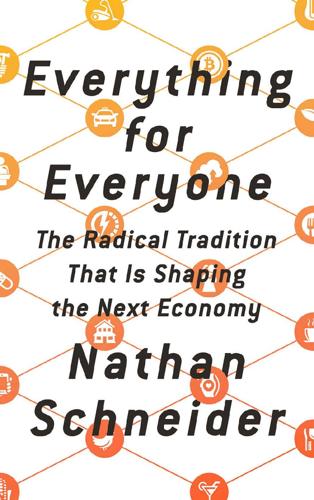
Everything for Everyone: The Radical Tradition That Is Shaping the Next Economy
by
Nathan Schneider
Published 10 Sep 2018
It fit into a widely felt longing at the time, evident in many parts of Europe and North America where protest had been breaking out, to start figuring out practical alternatives to the failed order. This was the period, too, of National Security Agency whistleblower Edward Snowden’s leaks, of persecuted hacker Aaron Swartz’s suicide, of blockades against techie commuter buses in San Francisco. Google became one of the world’s leading lobbyists, and Amazon CEO Jeff Bezos bought the Washington Post. The internet could no longer claim to be a postpolitical subculture; it had become the empire. As tech achieved its Constantinian apotheosis, old religious tropes seemed to offer a return to lost purity, a desert in which to flee, the stark opposite of Silicon Valley.
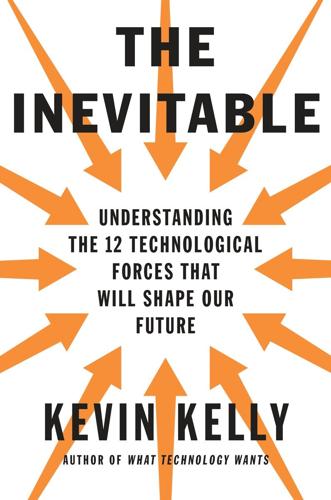
The Inevitable: Understanding the 12 Technological Forces That Will Shape Our Future
by
Kevin Kelly
Published 6 Jun 2016
tried to harness readers’ reports: Rachel McAthy, “Lessons from the Guardian’s Open Newslist Trial,” Journalism.co.uk, July 9, 2012. OhMyNews in South Korea: “OhMyNews,” Wikipedia, accessed July 30, 2015. Fast Company signed up 2,000: Ed Sussman, “Why Michael Wolff Is Wrong,” Observer, March 20, 2014. smaller number of editors: Aaron Swartz, “Who Writes Wikipedia?,” Raw Thought, September 4, 2006. “an old-boy network”: Kapor first said this about the internet pre-web in the late 1980s. Personal communication. not exactly a bastion of equality: “Wikipedia: WikiProject Countering Systemic Bias,” Wikipedia, accessed July 31, 2015. 9,000 startups in 2015: Mesh, accessed August 18, 2015, http://meshing.it.
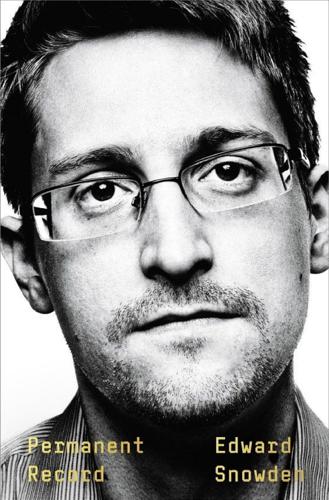
Permanent Record
by
Edward Snowden
Published 16 Sep 2019
A major part of the organization’s brief is to preserve and strengthen First and Fourth Amendment rights through the development of encryption technologies. To that end, the FPF financially supports Signal, an encrypted texting and calling platform created by Open Whisper Systems, and develops SecureDrop (originally coded by the late Aaron Swartz), an open-source submission system that allows media organizations to securely accept documents from anonymous whistleblowers and other sources. Today, SecureDrop is available in ten languages and used by more than seventy media organizations around the world, including the New York Times, the Washington Post, the Guardian, and the New Yorker.
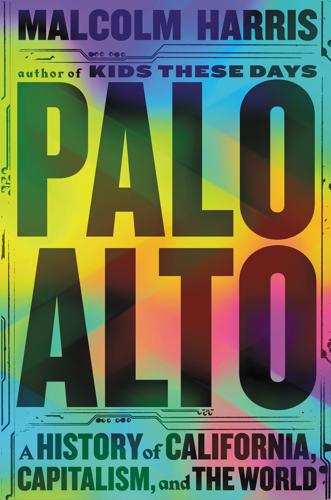
Palo Alto: A History of California, Capitalism, and the World
by
Malcolm Harris
Published 14 Feb 2023
Rebellious or truly disruptive uses of the technology faced higher scrutiny. In 2011, hacker and Reddit cofounder Aaron Swartz scraped the JSTOR academic database, intending to open the fenced corpus of scholarship to the masses. Despite his public-minded motivations, federal prosecutors refused any plea deal that didn’t involve prison, and the brilliant Swartz ended his own life at age twenty-six rather than surrender his freedom. Tickets.com, yes; Napster, no. Google, yes; Facemash, no. Acxiom, yes; Aaron Swartz, no; Facebook, yes. The most aggressive of these models raced ahead of their creators, “moving fast and breaking things,” as Facebook’s motto said.
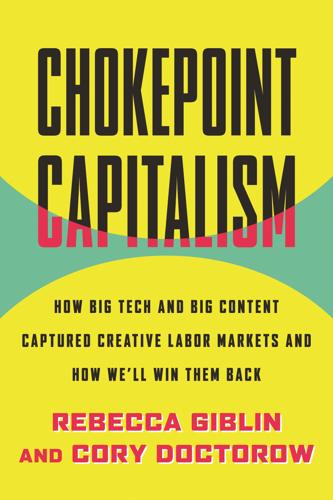
Chokepoint Capitalism
by
Rebecca Giblin
and
Cory Doctorow
Published 26 Sep 2022
A 2021 US Supreme Court decision left it ambiguous whether simple terms-of-service violations could violate the law.13 Alternatively, we need legislation clarifying that the CFAA can’t be used to criminalize terms-of-service violations, like “Aaron’s Law” would have. Rep. Zoe Lofgren introduced this bipartisan bill in 2013 to honor the computer pioneer Aaron Swartz, hounded to death by CFAA threats when he was only twenty-six years old. But with so many corporations relying on the CFAA to maintain their chokepoints, the bill still hasn’t made it into law. Then there’s all the other laws deployed to block interop: patents, API copyrights, nondisclosure, binding arbitration mandates, and non-compete clauses.
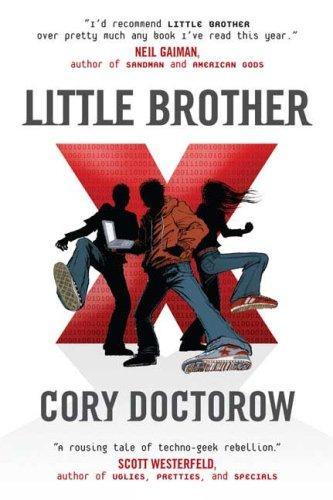
Little Brother
by
Cory Doctorow
Published 29 Apr 2008
Scott and his wife Justine Larbalestier were my partial inspiration to write a book for young adults -- as was Kathe Koja. Thanks, guys. &&& Acknowledgments This book owes a tremendous debt to many writers, friends, mentors, and heroes who made it possible. For the hackers and cypherpunks: Bunnie Huang, Seth Schoen, Ed Felten, Alex Halderman, Gweeds, Natalie Jeremijenko, Emmanuel Goldstein, Aaron Swartz For the heroes: Mitch Kapor, John Gilmore, John Perry Barlow, Larry Lessig, Shari Steele, Cindy Cohn, Fred von Lohmann, Jamie Boyle, George Orwell, Abbie Hoffman, Joe Trippi, Bruce Schneier, Ross Dowson, Harry Kopyto, Tim O'Reilly For the writers: Bruce Sterling, Kathe Koja, Scott Westerfeld, Justine Larbalestier, Pat York, Annalee Newitz, Dan Gillmor, Daniel Pinkwater, Kevin Pouslen, Wendy Grossman, Jay Lake, Ben Rosenbaum For the friends: Fiona Romeo, Quinn Norton, Danny O'Brien, Jon Gilbert, danah boyd, Zak Hanna, Emily Hurson, Grad Conn, John Henson, Amanda Foubister, Xeni Jardin, Mark Frauenfelder, David Pescovitz, John Battelle, Karl Levesque, Kate Miles, Neil and Tara-Lee Doctorow, Rael Dornfest, Ken Snider For the mentors: Judy Merril, Roz and Gord Doctorow, Harriet Wolff, Jim Kelly, Damon Knight, Scott Edelman Thank you all for giving me the tools to think and write about these ideas. &&&$ Creative Commons Creative Commons Legal Code Attribution-NonCommercial-ShareAlike 3.0 Unported CREATIVE COMMONS CORPORATION IS NOT A LAW FIRM AND DOES NOT PROVIDE LEGAL SERVICES.
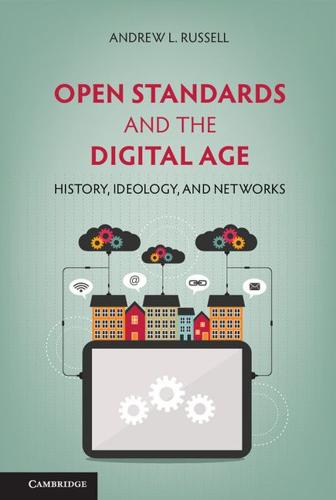
Open Standards and the Digital Age: History, Ideology, and Networks (Cambridge Studies in the Emergence of Global Enterprise)
by
Andrew L. Russell
Published 27 Apr 2014
Google’s high-minded defense of the freedom of expression was, the Global Times declared, a ruse – a “disguised attempt to impose its values on other cultures in the name of democracy.”6 The inherent contradictions and tensions bundled within terms such as “openness” and “transparency” have been further exposed by activists such as Chelsea Manning, Aaron Swartz, and Edward Snowden who put powerful institutions in uncomfortable positions by publicizing data that were intended to be secret. In other words, openness (and its ally, transparency) is easy to promote in rhetoric but more complicated to adhere to in practice. One comes away from the popular accounts of high-tech globalization with an oversimplified, linear, and somewhat deterministic view of the relationship between technology and society: for better and for worse, the Internet and digital technologies have thrust an unprecedented era of openness on us.
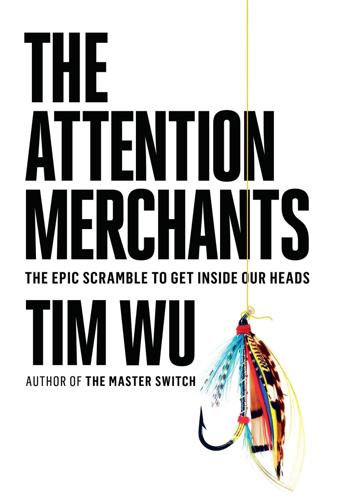
The Attention Merchants: The Epic Scramble to Get Inside Our Heads
by
Tim Wu
Published 14 May 2016
Of course, all human communication is slightly inauthentic, but in person or even on the telephone there are limits to our dissimulations. The sugared-cookie-cutter self-styling enabled by Facebook made America seem a Lake Wobegon online. In retrospect, the 1950s looked dark and angst-ridden by comparison. * * * *1 Zuckerberg was fortunate; a superficially similar stunt pulled off on the MIT network by a hacker named Aaron Swartz led to a federal indictment on multiple felony counts. *2 Gates, incidentally, scored a 1590/1600 on his SAT, while Zuckerberg scored a perfect 1600. *3 In her study, boyd quoted a white teenager who explained why she’d made the switch. “I’m not really into racism,” she said, “but I think that MySpace now is more like ghetto or whatever.”
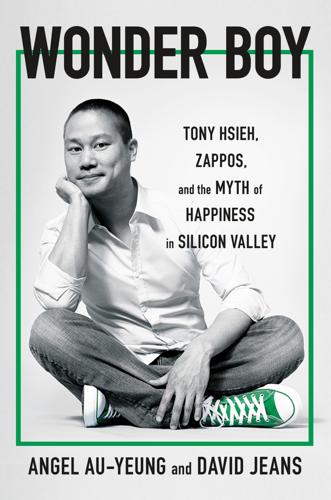
Wonder Boy: Tony Hsieh, Zappos, and the Myth of Happiness in Silicon Valley
by
Angel Au-Yeung
and
David Jeans
Published 25 Apr 2023
Prominent venture capitalist Jason Calacanis wrote at the time that Sherman was remembered for being “relentlessly positive, driven and fun,” and that “he was a human router who left an impression.” Calacanis said Jody’s death forced him to think about two other entrepreneurs who had died by suicide recently: Aaron Swartz, the twenty-six-year-old co-founder of Reddit, and twenty-two-year-old Ilya Zhitomirskiy, who had founded the social networking site Diaspora. “Perhaps we owe it to these three amazing humans to examine if the pressures of being a founder, the pressure of our community’s relentless pursuit of greatness, in some way contributed to their deaths?”
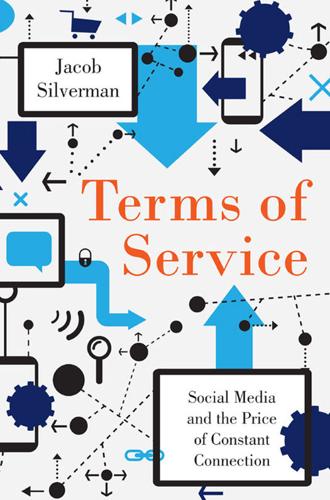
Terms of Service: Social Media and the Price of Constant Connection
by
Jacob Silverman
Published 17 Mar 2015
Their “open source activism” becomes stronger, and more inclusive, as it spreads. At the Rhizome Seven on Seven conference, an annual showcase in which a technologist and an artist spend a day working together to create something new—an app, a video, a presentation—the emphasis is usually on novel deployments of existing technologies. For example, one year the late Aaron Swartz and the artist Taryn Simon created Image Atlas, a site that shows Google image results from seventeen different countries, illustrating how search results are contextually dependent. The effect is mutual, with search results also potentially shaping local attitudes. An Afghan searching for “Americans” will see photos of soldiers and George W.
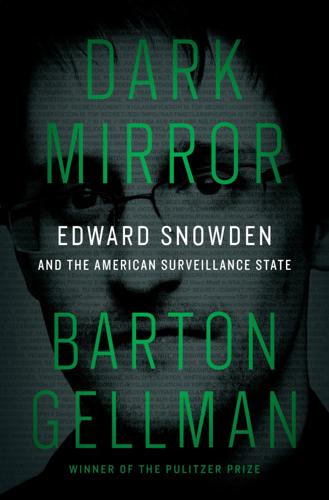
Dark Mirror: Edward Snowden and the Surveillance State
by
Barton Gellman
Published 20 May 2020
It is still the safest way to reach me in confidence if you have reason for concern about repercussions. (My Twitter profile @bartongellman points to a page to get you started.) SecureDrop, which requires no technical knowledge to use, had been introduced the previous year as a newsroom tool by the Freedom of the Press Foundation, based on code written by Aaron Swartz, Kevin Poulsen, and James Dolan. Having advertised a way to get in touch anonymously, I expected to receive malware as well as submissions from internet trolls and conspiracy theorists. I got my share of all of those, alongside valuable reporting tips. Most of the malware was run of the mill.
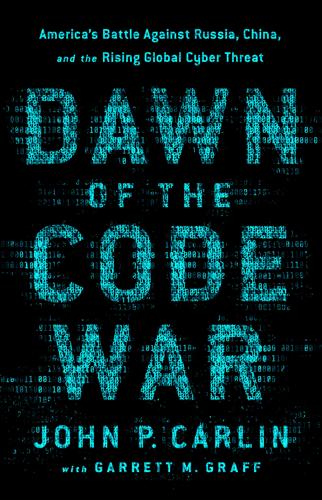
Dawn of the Code War: America's Battle Against Russia, China, and the Rising Global Cyber Threat
by
John P. Carlin
and
Garrett M. Graff
Published 15 Oct 2018
* The fraternity of prosecutors with computer crime experience remains small to this day; years later, in 2007, I replaced Klumb as the coordinator of the Justice Department’s special computer crime prosecutors. * Nearly a quarter century later, these questions are still largely unanswered; we’d see echoes of many of these hard questions in the story of another MIT graduate student, Aaron Swartz, who committed suicide in 2013 after being prosecuted under the Computer Fraud and Abuse Act for downloading journal articles from MIT’s network. * It was a theme we’d see for years, even in cases such as Sony, where the company had to switch to faxes and printed messages to communicate with its workforce.
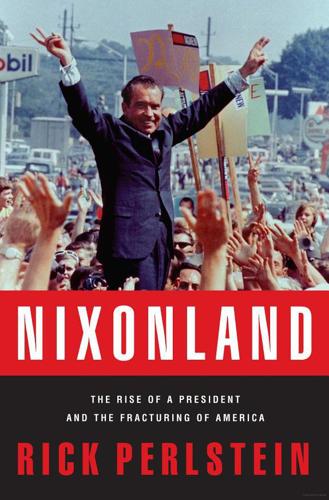
Nixonland: The Rise of a President and the Fracturing of America
by
Rick Perlstein
Published 1 Jan 2008
And Rick Shenkman’s work fostering a community space for historians at HistoryNewsNetwork.com has been marvelous. I received generous support for the project from Dave Block, Dan Cantor, George Chauncey, Kevin Drum, Tom Frank, Frank Geier, Hank and Pat Geier, David Glenn, Michael Kazin, Mark and Carol Leff, Stanley Kutler, John Palattella, my parents Jerry and Sandi Perlstein, Aaron Swartz, the late James Weinstein, Eric Wunderman, and the White House Historical Association. Thanks, too, to Eric Alterman and Rick MacArthur for their quiet advocacy. When I wrote my first book, my ability to reconstruct the mental world of activists working for political change was profoundly enhanced by my work as a participant-observer with the New York Working Families Party.
…
And I’m exceptionally proud to now be working as a senior fellow with Campaign for America’s Future, my new institutional home. Brilliant friends have read chunks, and more than chunks, of this manuscript in various states of undress and improved it considerably. These include Thomas Geoghegan, Christopher Hayes, Paul Krugman, Allison Xantha Miller (thanks for Punishment Park!), Aaron Swartz (thanks for the website!), Jason Vest (thanks for the inspired and inspiring grouchiness!), Kyle Westphal (thanks for the author photo!), and the Washington, D.C., reading group whose members include Charlie Cray, David Glenn (thanks for the Rolling Stone cache!), Henry Farrell, David Frum, Scott McLemee, Krist Raab, Jim McNeill, and Rich Yeselson.
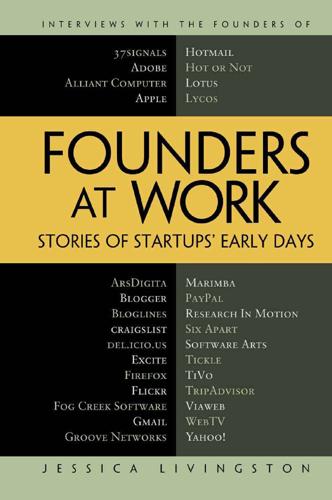
Founders at Work: Stories of Startups' Early Days
by
Jessica Livingston
Published 14 Aug 2008
I’d like to thank many people for their willingness to make introductions: Jim Baum, Patrick Chung, Mark Coker, Jay Corscadden, Rael Dornfest, Jed Dorsheimer, Randy Farmer, Steve Frankel, Anand Gohel, Laurie Glass, James Hong, Mitch Kapor, Morgan Ley, Mike Palmer, Tom Palmer, Bryan Pearce, Andrew Pojani, Will Price, Ryan Singel, Langley Steinert, Chris Sacca, and Zak Stone. Thanks to Kate Courteau for creating cozy offices for me to work in; Lesley Hathaway for all her advice and support; Alaina and David Sloo for their many introductions; and Sam Altman, Paul Buchheit, Lynn Harris, Marc Hedlund, and Aaron Swartz, who read early chapters of the book. I owe thanks to Lisa Abdalla, Michele Baer, Jen Barron, Ingrid Bassett, Jamie Cahill, Jessica Catino, Alicia Collins, Caitlin Crowe, Julie Ellenbogen, John Gregg, Chrissy Hathaway, Katie Helmer, Susan Livingston, Nadine Miller, Sara Morrison, Bridget O’Brien, Becky Osborne, Allison Pellegrino, Jennifer Stevens, and Suzanne Woodard for their encouragement.

Reaganland: America's Right Turn 1976-1980
by
Rick Perlstein
Published 17 Aug 2020
Senator Howard Baker Lee Annis, Howard Baker: Conciliator in an Age of Crisis (Knoxville, TN: Howard Baker Center, 2007), 125. His pollster Adam Clymer, Drawing the Line at the Big Ditch: The Panama Canal Treaties and the Rise of the Right (Lawrence: University Press of Kansas, 2008), 80. value of the dollar UPI, January 7, 1978. Chicago Sun-Times series Aaron Swartz, “Is Undercover Over? Disguise Seen as Deceit by Timid Reporting,” Fair, March 1, 2008. welfare funds AP, January 16, 1978. twenty-two thousand Cuban troops Washington Post Service, February 15, 1978. Carter called him Carter, White House Diary, 164. As introduced in 1974 Robert M. Collins, More: The Politics of Economic Growth in Postwar America (New York: Oxford University Press, 2000), 167.